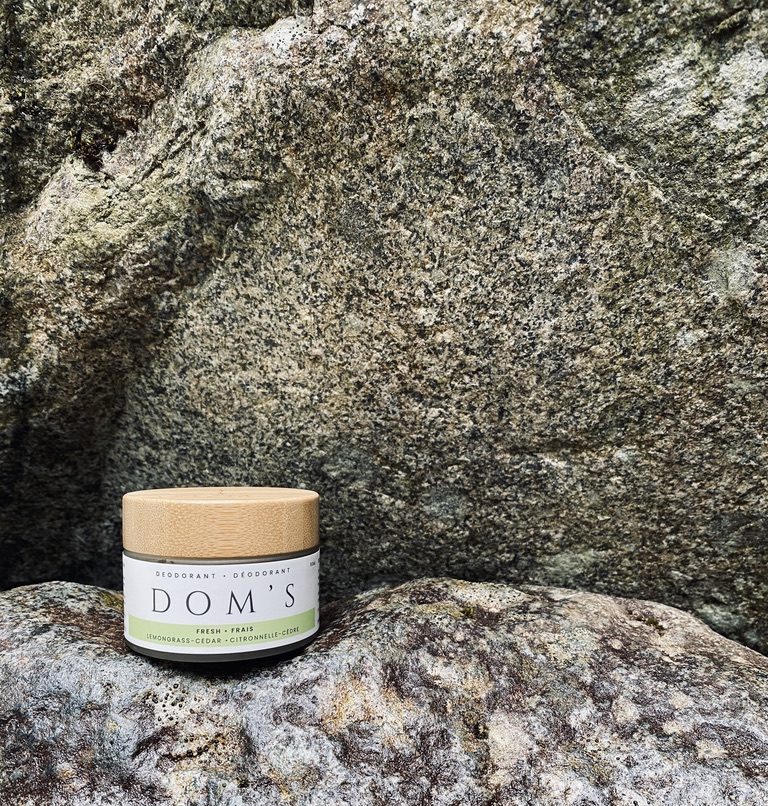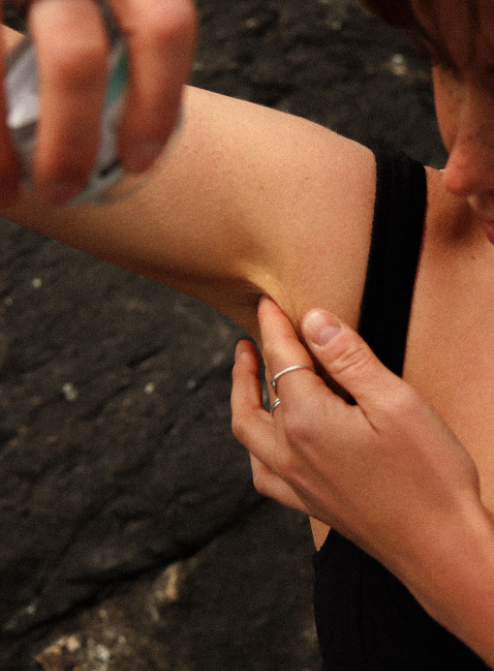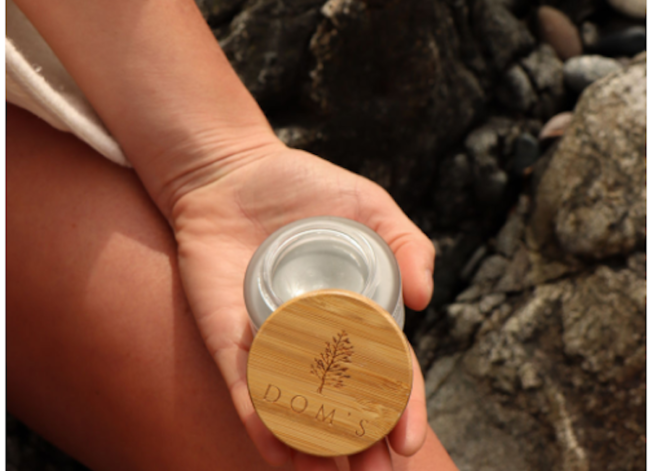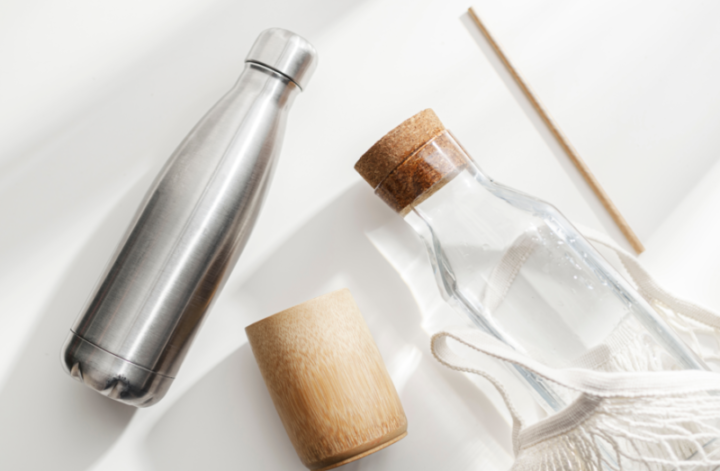Deodorant is a common product used in our daily hygiene routine. In fact, 90% of Americans use deodorant or antiperspirant every day. But do you know the risks with commercial deodorants and why we should switch to natural deodorant?
Many commercial deodorants contain harmful chemicals like aluminum salts and parabens that block our pores, inhibiting our natural body processes. These chemicals are readily absorbed by the skin and enter the bloodstream before being metabolized by the liver. Worse yet, most commercial deodorants are sold in hard to dispose of plastic applicators that eventually break down into microplastics and pollute the environment.
It was for these reasons that DOM’s deodorant came to life. DOM’s natural deodorant was born from a passion for the health of our bodies and the planet. Made from plant-based, organic and natural ingredients, the deodorant naturally neutralizes body odor and won’t block your pores. Prioritizing sustainability, DOM’s designed its deodorant packaging to be 100% plastic-free and reusable either by refilling at your local refillery or for use in another application.
The Difference Between Deodorant and Antiperspirant
For most, the priority when buying deodorant is to find one that smells nice and masks the smell of our body odor at any cost. But there’s something more important we often don’t consider: the difference between deodorant and antiperspirant.
Deodorant is formulated to neutralize odor-causing bacteria, while an antiperspirant contains aluminum-based salts that reduce perspiration by blocking the sweat glands. The problem is, over time toxins build up in the sweat glands and may cause an increase in body odor, even though you’re continuing to use the product.

The Benefits of Natural Deodorant
Our bodies are designed to sweat as a means to cool off when our body temperature increases. Even better, sweating is the body’s version of a natural cleanse. The more we sweat, the more toxins we are ridding the body of. A really important bodily function since many are exposed to harmful pollution and chemicals in the products they use.
When formulating their natural deodorant, DOM’s understood that our skin is the body’s largest organ and is susceptible to the absorption of the products we put on it. A problem because the harmful chemicals in deodorant can directly enter the bloodstream. This isn’t a worry with DOM’s natural deodorant. Creating a product that puts personal health above all else, DOM’s sources its ingredients based on quality, sustainability and the ability to maintain natural bodily functions, like perspiration.
So how does natural deodorant work? To neutralize odor-causing bacteria, DOM’s uses a low baking soda and dietary magnesium blend that won’t cause skin irritation, yet keeps you fresh on the daily or through your toughest workouts. I can attest to both claims. Being a sensitive-skinned, outdoor enthusiast I was nervous to try a natural deodorant containing baking soda. I’ve been using DOM’s for the past 3 years and have yet to experience skin irritations or the embarrassment of body odor.
Tips on Making the Switch to Natural Deodorant
When making the switch to natural deodorant, you may find yourself going through an adjustment period lasting about a week or two. During this time, you may feel you’re sweating more than usual or that your body odor is reaching new all-time highs.
This transition period is normal, so don’t let it deter you from using a natural deodorant. Remember, your old aluminum-based deodorant was blocking your sweat glands and trapping toxins in. As you make the switch, your sweat glands will open up, and years of stored sweat and bacteria will come flooding out. This is a good thing you’re detoxing your armpits! Be happy and proud that your body is restoring its natural balance. Here are a few tips on managing the switch.

Sweat more
This may seem counterintuitive but remember sweating is good for the body. By increasing your physical activity during the transition period you’re helping speed up the removal of toxins from your body. If you’re excessively sweating or the odor is becoming too much to bear, try some of these natural remedies.
Drink lots of water
Remember, we sweat to cool off. If you’re sweating excessively, try increasing your water intake. Staying hydrated will help regulate your body temperature, reducing the amount you sweat. In addition, increasing your water intake will keep you hydrated by replenishing the water loss caused by excess sweating.
Decrease your caffeine intake
Caffeine stimulates our nervous system, causing us to sweat (as a coffee-lover, I know this to be true!). This results in increased heart rate and opens the floodgates (aka our sweat glands).
Try a clay mask or detox bath
During the transition, you’ll know why your body odor is at an all-time high but your peers won’t. To fight the increased body odor, try a raw apple cider vinegar (ACV) detox bath or dilute a small amount of ACV in water and apply it to the skin using a cloth. ACV has antimicrobial properties that may effectively kill bacteria found on the skin, reducing odors. Another option is to try a bentonite clay and ACV mask. Bentonite clay helps draw out toxins, and the ACV helps to kill the odor-causing bacteria.
Wear loose fitting clothing and natural fibres
Skip the sweat-stained shirts and opt for loose fitting tops instead. Wearing loose fitting clothing allows air to flow through your top, cooling your body and drying moisture on the skin. Breathable natural fibers are great at keeping you cool, preventing staining and odor build-up on your shirt.
Is your food contributing to your B.O?
Have you ever noticed a change in your body odor after eating certain foods or a night out at the pub? This is your body reminding you that it’s working to remove unwanted chemicals in the body. When we consume food or drink, our body gets to work breaking it down to extract the chemicals needed for proper function and expels the unwanted chemicals.
Try to avoid body odor-inducing foods while you’re transitioning, such as cruciferous vegetables (cauliflower, broccoli, brussel sprouts), spicy foods, cumin, curry and alcohol. When metabolized, these foods release chemicals (sulphur, acetic acid or volatile organic compounds) that feed the bacteria on the skin, intensifying our body odor.
Are you ready to make the switch to a natural deodorant?
As with any transition, it’s important to understand and monitor your body’s reaction to the change. If you’re experiencing irritation or rash, discontinue using the product but don’t swear natural deodorant off completely. It could just be that one formula isn’t compatible with your skin type. With so many options on the market today there is sure to be a natural deodorant for any skin type. Just remember to read the labels and ingredient list carefully.
This article was prepared in partnership with DOM’s Deodorant




